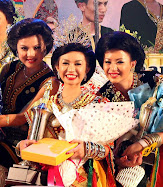Maliau Basin located deepn in the interior of Sabah is one of the world's premier ecological centres.
The Basin derives its name because of its mystery and unique basin shaped at 1,900 metres above sea-level, with its own skies and cloud formations.
Hence, earning the nickname - The Lost World.
Here, one can experience wonders of nature including countless flora and fauna species as well as boasting one of the highest density of waterfalls ever found in one place.
On the morning of Saturday, January 29th, 2011, history was made when Maliau Basin was visited by Malaysia's number one, the Prime Minister himself, Datuk Seri Mohd Najib Tun Abdul Razak.





During his visit to Maliau Basin, the Premier said Malaysia is very keen to list Sabah's Lost World, the Maliau Basin as a world heritage site.
In endorsing the state government's proposal, Najib said a World Heritage listing by UNESCO would bring immediate world attention and interest in the 58,400-hectare untouched tropical rainforest, just slightly smaller then Singapore.
He said the heritage listing of Mount Kinabalu National Park, George Town, Gunung Mulu National Park and Malacca had seen a jump in worldwide interest in such areas of natural or historical importance.
However, he said there was a lot of work to be done to obtain such a World Heritage status as the government and various had to meet with various guidelines to be able to meet the requirements of Unesco in listing it as a world heritage site.
“I would support the Chief Minister in getting this place listed as a world heritage site," he told reporters after becoming the first Prime Minister to step foot in the Maliau Basin where he opened the Maliau Basin Studies Centre and also launched the study of the Stability of Altered Forest Eco-Systems (SAFE) conducted by Royal Socieity of UK and sponsored by Sime Darby Foundation, that is set to become the world’s largest ecological experiment.
Najib said that Maliau Basin was becoming an integral part of an ecological experiment in an area that contained rare flora and fauna, including six types of pitcher plants and more then 80 species of orchids and endangered wildlife, from rhinocerous to orang utans.
''Only about 25% of Maliau Basin has been explored. From four major expeditions between 1986 to 2005, we learned it has the greatest number of waterfalls any where in Malaysia.
“About 40 of them, in all, including the famous seven-tiered Maliau Falls and Sabah's only ox-bow lake called Lake Linumunsut."
However, he said conservation required funding and hoped the private sector, local and international, could play a significant role in sustaining and extending Malaysia's conservation efforts.
''This will be crucial in making Maliau Basin Studies Centre a premier facility for tropical rainforest, research and scientific discovery in the region," he added.
In Maliau Basin, Datuk Seri Najib also said certain Western critics of Malaysia’s oil palm industry were taking a narrow view of the issue when they ignore the benefits of the industry to those who depend on it for their livelihood.
“The critics fail to understand we have a responsibility to our people who depend on oil palm and this does not include smallholders and companies.
“Compared to others, we are doing better in sustainable development and preservation of the environment,”.
Earlier in his speech, he said the SAFE project was important as it was in line with Malaysia’s commitment to conservation and will help address many issues the world is facing, especially climate change, as a result of deforestation.
“This project will make a major contribution to understanding how biodiversity can be protected and maintained in our plantations.
“It will also assess how to balance the economic benefits of the oil palm industry with the need for environmental conservation and sustainable development,” he added.
Najib said that, to date, there has been no definitive study on the quantifiable impact of deforestation on wildlife, water quality, nutrient cycle and soil stability.
“At best, what we have are educated guesses which are not sufficient to make important decisions that could affect our environment.”
Najib said the project will help address the issue of deforestation and the impact of oil palm plantations properly.
“We need long-term, large scale ecological experiments like SAFE to give us concrete answers that can help guide any modifications in the way oil palm plantations are operated.”
The Maliau Basin Studies Centre and the Stability of Altered Forest Ecosystems (SAFE) project is a 10-year study costing RM 30 million is sponsored by Sime Darby and is undertaken by the Royal Society’s South-East Asia Rainforest Research Programme and is set to become the world’s largest ecological experiment.































No comments:
Post a Comment